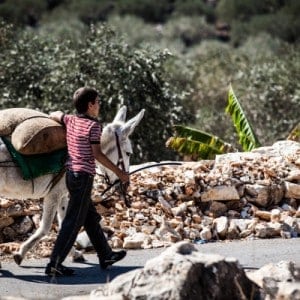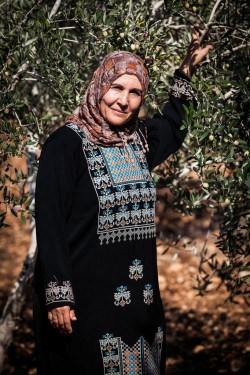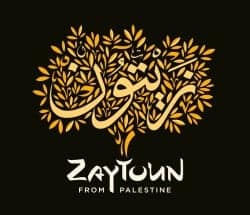Greenhouse Fairtrade Pioneer: Cathi Pawson, Co-Founder Zaytoun

For our final Fairtrade Pioneer we are celebrating the inspiringwork of one of Greenhouse’s clients, Zaytoun.It is nearly 10 years since founders, Heather Massoud and Cathi Pawson, visited Palestine on peace missions, and they now work withPalestinian producers to supply the UK with fairly tradedoliveoil, maftoul (couscous), dates, za’atar, almonds and soap.
There has never been a more poignant time to tell the story of the pioneering women behind Zaytoun, as we hear of the traumas and the impact of the war in Palestine. In this republished interview,Cathitells us about the story of setting up a Fairtrade social enterprise to provide a market for the amazing produce made by the people in Palestine.
Tell us about Zaytoun – what’s your mission?
Zaytoun’s mission is to sell artisan fairly-traded Palestinian produce that carries the story of the producers and their land.
What motivates you?
The injustice of the illegal occupation of Palestine continues to worsen, with draconian restrictions on movement, land access and trade. Whilst sales of olive oil itself will not be enough to end the occupation, we have found that there are vast numbers of caring and passionate people across the UK who appreciate a tangible way to show support the women and farming families across the region.
Beyond the economic lifeline that Zaytoun products bring to many farming families, the benefits of fair trade also lie in bringing people together, in creating a connection between peoples and a greater understanding of each other. The isolation of many of the people in Palestine is a painful situation imposed by the Israeli occupation – we hope our products help to build bridges that go beyond borders.
What is your greatest achievement to date?
Supporting Palestinian farmers over the last five years to produce the world’s first ever Fairtrade olive oil and getting it out to customers across the UK and Ireland.
What are the challenges you face?
Right now there are movement and access restrictions across the West Bank which make it difficult for farmers to reach their lands, tend crops and get produce to market both locally and internationally. We used to import maftoul from Gaza but since the economic blockade we are no longer able to support those Gazan farmers.
We’re a social enterprise, a CIC, so we’re open to grant funding for research and development work which benefits the farmers from whom we source, but because so many of our resources are tied up in the day-to-day running of the business, we find it difficult to pull in those funds that would help us further our work in Palestine.
What are you working on that’s getting you fired up?
 We’re really excited about our 10-year anniversary this year, looking at our historical evolution from a volunteer enterprise to a fully-fledged social enterprise, and talking to our most passionate and loyal customers about why they are still involved with Zaytoun. We have a stunning new look for our whole range to celebrate, it’s been great to see the new labels arriving on all our products this year.
We’re really excited about our 10-year anniversary this year, looking at our historical evolution from a volunteer enterprise to a fully-fledged social enterprise, and talking to our most passionate and loyal customers about why they are still involved with Zaytoun. We have a stunning new look for our whole range to celebrate, it’s been great to see the new labels arriving on all our products this year.
Where do you want to take Zaytoun next?
We think there’s potential to sell our new-look range into multiples, as well as the fine food market, which has recently taken an interest in our products. We’d like to sell more of our existing products and expand the range further, with organic and Fairtrade certification wherever possible. We’ve a brand new product, freekeh, which is doing well too – it’s always exciting to innovate!
And finally, if we win some research funding, we’d love to expand our work with farmers in areas we’ve not focused on yet, bring out some new materials to tell their story to our public.
What can we, as individuals, do to make a difference?
Buy our products, run a Zaytoun stall at your local fete, school or place of worship, invite a producer to speak to your community during the Fairtrade Fortnight tour, take a trip to Palestine with Zaytoun.
The trips we run at harvest time are life-changing, and long-term friendships are formed between British customers and Palestinian families.
Whenever we visit Palestine and ask the farmers ‘What can we do to help?’ their answer is ‘Tell our story, that we are people just like you’. So, befriend a family in Palestine, hear their story and tell others.
If you were Prime Minister for a day, what would be the first thing you’d do?
Stop arming Israel and withdraw economic and political support for the occupation.
What’s the coolest project you’ve come across?
Right now, it has to be this solar power project in Gaza. Power cuts can affect Gaza hospitals so badly that medical operations sometimes have to be carried out under the faint light provided by doctors’ mobile phones.
Eager to improve this situation, a Gaza-based scientist has teamed up with an international group to undertake a renewable energy project for the health sector.
Its aim is to provide 168 solar panels and other equipment for Jenin Hospital in al-Shajaiyeh neighborhood, east of Gaza City.

Can you recommend a life-changing book for our readers?
Ilan Pappe’s ‘The Ethnic Cleansing of Palestine’
What do you listen to when you’re cooking dinner?
The Archers!
What’s the best advice you’ve ever been given?
‘Whatever you think you can do or believe you can do, begin it. Action has magic, grace and power in it.’ Goethe
Who’d be your Eco Hero?
Jon Snow, for his dedication and courage as a journalist to bring out the humanitarian truths beyond the propaganda that so often muddies journalism.



